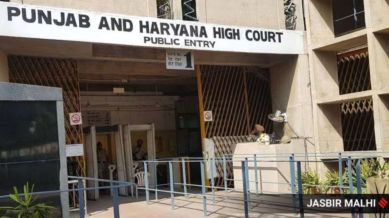Stay updated with the latest - Click here to follow us on Instagram
HC rules against Sedhu Ram’s family: 44-year-old legal battle over land ends with a no
Justice Gupta disagreed. He confirmed the deal’s existence, observing that the witnesses’ testimony outweighed Bihari Lal’s denial. But he held that the agreement was conditional upon paying off debts within three years, something Sedhu Ram never did. “Failure to prove readiness dis-entitles relief,” he said, citing precedent.

Justice Deepak Gupta of the Punjab and Haryana High Court on Wednesday delivered the final word in a land dispute that has dragged on for more than four decades, ruling against the family of Sedhu Ram and closing a bitter fight that began in 1981. The case revolved around a deal to sell farmland in Khor village, Tehsil Narnaul, but stretched so long that both the original parties, Sedhu Ram and Bihari Lal, died while their heirs carried on the legal battle.
The dispute began on July 15, 1981, when Bihari Lal, who owned 35 kanal 16 marla of land, agreed to sell a third of it to Sedhu Ram and another villager, Matadin. Instead of paying Bihari Lal directly, Sedhu Ram was supposed to use ₹5,040 to clear Bihari Lal’s debts within three years, after which the land would become his. Sedhu Ram later claimed he had sent notices to the creditors, but Bihari Lal denied the deal altogether, calling it a fake settlement. That clash of claims sparked a lawsuit that would span generations.
monthly limit of free stories.
with an Express account.
Sedhu Ram first went to court before 1986, but he withdrew the case on December 8, 1986, without securing permission to refile. Just two days later, on December 10, he tried again with a fresh suit. The local court examined the evidence and, on September 21, 1991, accepted that the agreement was genuine—based on testimony from the scribe and witnesses, but said it could not be enforced. The reason: Sedhu Ram had not cleared the debts within three years, nor had he shown readiness to follow through. Withdrawing the first case without leave also meant the second could not survive.
On appeal, a higher court upheld that finding on April 2, 1992, noting that the time limit had run out. The deal required action within three years of 1981, but the claim was filed five years later. The matter then moved to the High Court, where it remained pending for more than 30 years.
When the case finally came up for hearing, Sedhu Ram’s lawyer argued that he could not trace the creditors despite sending notices, and that he should not be denied the land for that reason.
Justice Gupta disagreed. He confirmed the deal’s existence, observing that the witnesses’ testimony outweighed Bihari Lal’s denial. But he held that the agreement was conditional upon paying off debts within three years, something Sedhu Ram never did. “Failure to prove readiness dis-entitles relief,” he said, citing precedent.
The court also ruled that withdrawing the 1986 suit barred the second attempt, and that the claim was time-barred since it was filed well beyond the three-year limit set in 1981. “This Court finds no infirmity in the concurrent findings of the courts below,” Justice Gupta said, dismissing the appeal.